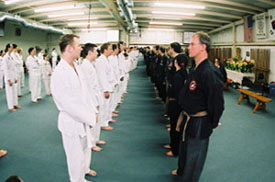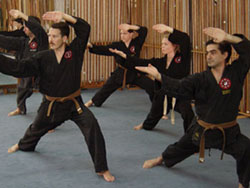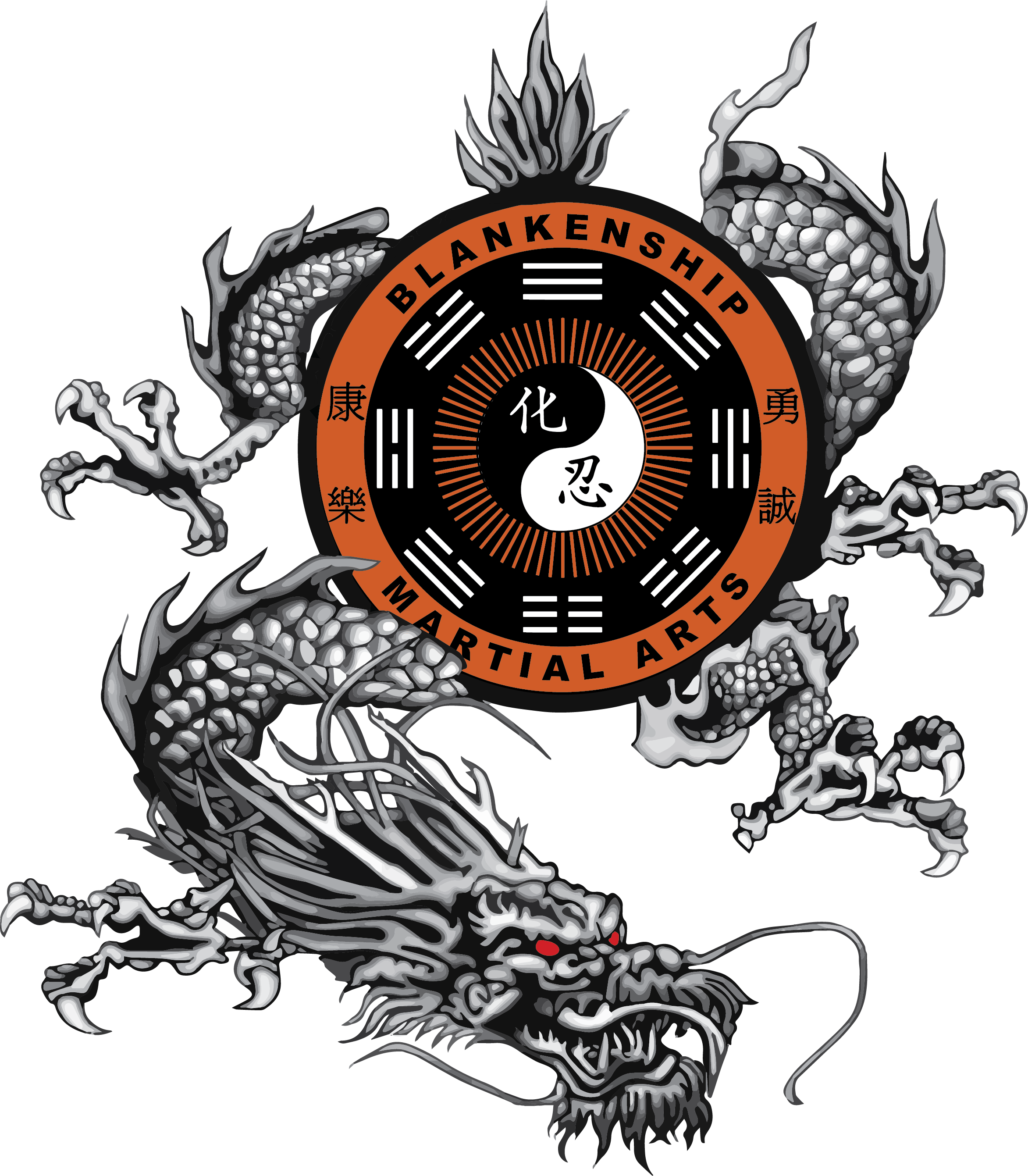Philosophy
Blankenship Martial Arts
Martial Art As Science  Martial Art As Philosophy
Martial Art As Philosophy
Many people call and ask about our school philosophy. Some are trying to find out if our martial art is either a religion or in some way promotes a set of spiritual beliefs. Many seem to be looking for a better, more interesting mode of enhancing fitness and health and a way to learn while they work. The majority wants to safely learn an effective means of defending themselves and their families.
 Although you might get some idea of these things by talking with someone on the telephone, your best tool for evaluation is your own perception and analysis in the class environment. By watching a class, you will find out immediately how the class looks and feels to you. You will easily determine if the people in the class seem to have similar aspirations and beliefs as you; you will see the level of intensity, the types and methods of teaching technique, and the skill level and attitudes of the students and instructors. As you watch and chat with an instructor, you will form and resolve questions that directly bear on your "philosophical" concerns.
Although you might get some idea of these things by talking with someone on the telephone, your best tool for evaluation is your own perception and analysis in the class environment. By watching a class, you will find out immediately how the class looks and feels to you. You will easily determine if the people in the class seem to have similar aspirations and beliefs as you; you will see the level of intensity, the types and methods of teaching technique, and the skill level and attitudes of the students and instructors. As you watch and chat with an instructor, you will form and resolve questions that directly bear on your "philosophical" concerns.
We respect your ability to perceive accurately and to be able to recognize a training environment which is appropriate for your own personal interests.
If, however, you think it might be of value to you, let me tell you how we generally perceive ourselves and distinguish our perspective. We believe that the Orient has provided, through trial and error over more than a thousand years, a profound paradigm for self-development, which can be turned to aid the achievement of many different types of individual goals.
Our objective is to teach our system of martial art so that each student can understand how to use the training to achieve their goals. With adherence to the core traditional principles -- humility, perseverance, respect, diligence, and excellence -- and training in a repertoire of physical and mental development skills that encompasses virtually every category of martial technique and internal development, our curriculum is one of the most comprehensive in the world.
We honor the martial artists preceding us who have given us the current body of martial knowledge which serves as our link to past traditions of challenge and honor. We accept the responsibility of continuing to train and research, so that we may further extend the understanding and enlightenment they began. Some of the tools they used - breathing, meditation, rigor in thought and physical effort - we use today in exactly the same way that the ancient masters used them.
Yet we are extending the frontier of martial wisdom through modern tools of cognitive and motor learning, human information processing, biomechanics, and exercise physiology.
We are teaching martial art as science and martial art as philosophy.
 Selecting a martial arts school can be a formidable task. There are hundreds of schools and scores of styles from which to choose. The combined influences of television, movies, friends and relatives, and many other sources have produced in almost every individual a fairly strong impression of what "martial arts" is. Many people seeking a school have even trained previously. All our previous experience contributes to the formation of a mental image of a martial arts training environment. We expect it to have certain characteristics - style, philosophy, tradition, technical skills, and pragmatic value.
Selecting a martial arts school can be a formidable task. There are hundreds of schools and scores of styles from which to choose. The combined influences of television, movies, friends and relatives, and many other sources have produced in almost every individual a fairly strong impression of what "martial arts" is. Many people seeking a school have even trained previously. All our previous experience contributes to the formation of a mental image of a martial arts training environment. We expect it to have certain characteristics - style, philosophy, tradition, technical skills, and pragmatic value.
Once we have decided to explore the possibility of training in martial arts, we must choose some method of selecting the school appropriate for us. Most individuals perform a due diligence examination by soliciting acquaintances they trust, doing some preliminary reading, or performing an Internet search. Many people perform a web search, apply some sort of screening function, and choose a few schools to call.
Having spoken to probably more than 100,000 people about martial arts over the past 45 years, the questions we are asked most frequently are about cost, location, and style. Although we understand that these are important considerations to many, let me suggest an orientation that might ultimately provide you with a better training experience. First, however, we shall comment briefly on each of these common questions.
Cost
While money has to be a consideration for us, the most important thing is to find the right school for each of us. Whether cost is important to us or not, it will be a concern only once, but the quality of the training will be a concern for us every day.
If you were purchasing a pair of brand-name athletic shoes, a gallon of gasoline, or a soft drink, then you should definitely buy it at the lowest price. Unless you have a relationship, personal or service, with someone at the store, cost may reasonably be the only concern.
Yet all martial arts and, more importantly, all teachers and ways of teaching are not the same. Even when different instructors claim to be teaching the same system or style, the differences in their approaches, knowledge, and skills will often be as dramatic as night and day. Your cost should be considered in the context of your aspirations and the quality you expect. At our school, we have always ensured that money will not be the determining variable for any student. If you are sincere about your interest, the staff will help design a program to accommodate you.
Location
It would be very convenient if the best school is just around the corner from where we work or where we live, like a convenience store. However, when we are looking for a martial arts school, we are considering the allocation of significant resources of time and effort to an endeavor.
We are also considering involving ourselves in an activity which might provide profound benefit; it serves us well to be willing to expend some effort to attend the best possible school. The small additional time it takes in transit to or from a great school will be more than compensated by our experience there.
Style
While styles and systems of martial arts certainly have different peripheral attributes; while some new fad is always pushing into the public consciousness; while debates will always rage about the merits or deficiencies of one set of skills, or one training strategy, versus another; the simple fact is that any style can be excellent or poor.
In our opinion, after almost sixty-four years of training and over forty-five years of teaching, the conceptual bases and benefits of virtually every style are the same. The mechanical principles, the resulting physiological adaptation, the attributes of cognitive and higher mental development, even the basic philosophical core is constant across styles.
The only consideration we would make when thinking about style is to make sure that the style is comprehensive enough to address all present or future goals you may have. Everyone enters the martial arts training environment with some goal or goals; almost everyone who continues training will find that their goals evolve over time to be much broader than they had expected. Your instructor should be experienced enough and incisive enough to help you as long as you require it. Consideration of the instructor will allow me to introduce an orientation to selecting a school which we hope you will find useful.
The most important thing you can do in trying to decide what school to attend is to visit the school and watch a class. Immersing yourself in the class environment will allow you to address three important variables: technical skills, style of teaching, and philosophical perspective.
Each of these variables is a direct reflection of the instructor, or instructors, and the students with whom you will be training. The attributes of the instructor are probably the most important variables which will impinge on your personal experience.
Instructor
The instructor should have a broad and deep level of technical expertise, enabling him/her to direct your progress for a year or a lifetime. This level of expertise requires many decades of practice, and it should require that the instructor continues to train daily. If the instructor has been trained correctly, the system will contain, both conceptually and specifically within its technical repertoire, virtually any technique or skill a student will require or want.
The instructor should have the ability to easily and clearly communicate this knowledge to the students. Your concern, after all, is not primarily whether this instructor is highly skilled, but whether the instructor can guarantee that you will achieve your own personal goals.
Therefore, the instructor should be attuned to the needs and interests of the students. The instructor should be aware of the different methods by which people learn, and the instructor should be flexible and creative enough to find the right way to teach each individual student.
The sole objectives of the instructor should be the progress, safety, and enjoyment of the students. If you find an instructor who manifests these attributes, your experience will be excellent.
If you would like to read a brief discussion of our orientation to martial arts training and teaching, please go to our School Philosophy page.
